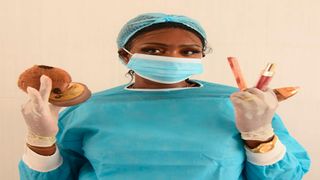
Ann Wanjiku, a mortician at the Pope Benedict XVI Hospital's morgue in Laikipia County applies makeup to the dead.
| Boniface MwangiNews
Premium
‘It’s a great honour’ What it's like to be a makeup artist for the dead
What you need to know:
- Ann Wanjiku found her calling as a mortuary makeup artist
- ‘I have majored in reconstruction and makeup. I love it when one looks good even in death. Grooming for men includes shaving, unplaiting, braiding, and weaving. Lazima uende kama umepiga luku.’
In the quiet corridors of mortuaries where life meets its inevitable end, Ann Wanjiku found her calling in the world of the departed.
After completing her secondary education, she embarked on a cosmetology course while awaiting admission to the university with dreams of becoming a lecturer.
Post her one-year cosmetology training, she secured employment in Nakuru, later moving to Nairobi for another year before a pivotal moment changed her trajectory.
In 2017, while accompanying a friend to a mortuary to prepare for a loved one's burial, Wanjiku encountered a callous gardener who demanded payment to summon the mortuary attendant from an entertainment joint.

Ann Wanjiku, a mortician at the Pope Benedict XVI Hospital's morgue in Laikipia County demonstrates how she applies makeup to the dead using a dummy at the facility.
“He came and treated us badly even after explaining why we were there. He just told us to get in and we saw bodies just lying there. But because it was our friend, we had to be brave. We had to bribe him to attend to us. When I went back home, I asked myself, what about those who are less privileged?” Wanjiku recalled.
However, the following day, while accompanying the family to collect the body, she met a lady mortician who treated them with compassion.
It is this later encounter which transformed her perception of mortuary work, inspiring her to pursue a career in mortuary science, focusing on reconstruction and makeup application.
“I never knew makeup could be applied to the dead. The lady even requested that I follow her to see for myself the whole procedure. To satisfy my curiosity, I followed the woman and watched the whole procedure. She was so passionate about doing it, even if it was on a dead person,” Wanjiku explains.
Motivated by this experience, she contemplated a career change and would, later on, enrol in a mortuary science course to handle the deceased respectfully.
Seeking her guardian's approval for this unexpected career shift, she was initially met with surprise and advised to take three months to reconsider her “weird’ decision.
“I am a go-getter, when I set my eyes on something I must do it. Three months were long for me. I went back after three weeks. He sent me to get exposure before I enrolled in school. For mortuary science courses school fees are paid up front. My guardian did not want to waste money,” Wanjiku explains.
She also participated in UpTurnship, a program preparing students for career success and joined an institution for a mortuary science course.
Following an attachment, she secured a position at Pope Benedict XVI Hospital in Nyahururu town where she is currently serving as the in-charge of the mortuary.
She is also advancing her Mortuary science studies at Masinde Muliro University.
According to Wanjiku, there are two types of make-up in her trade: basic cosmetics which is applied to every client, and advanced cosmetics that is tailored to family requests.
Men are usually groomed while women have their makeup on.
For those unaccustomed to makeup, Wanjiku advises families against it to ensure the person looks the same during viewing.
Detailed makeup requires preparation and takes 45 minutes to an hour.
“I have majored in reconstruction and makeup. I love it when one looks good even in death. Grooming for men includes shaving, unplaiting, braiding, and weaving. Lazima uende kama umepiga luku. For me, I go to work with makeup on. When someone sees me, they want their loved ones to look as good as me,” she said in an interview with Nation.africa.

Ann Wanjiku is a makeup artiste for the dead.
While she acknowledges the lack of prior connections with the deceased, Wanjiku relies on her initiative to learn about their grooming habits.
Her first encounter with the mortuary involved adjusting to the unfamiliar smell, eventually building tolerance over time.
Her day commences at 7.30 am by having a quick meeting with the night nurse, overseeing burial arrangements, conducting final body preparations, checking night occurrences and ensuring cabinet records align with the bodies.
“The secret is to avoid emotional attachment to clients; you just handle them professionally since you are a service provider. But since we are human beings, it is usually hard to detach. We always have debriefing sessions when you find yourself overwhelmed. It gets easier along the way,” she said.
She went on: “We dress them before the burial as we do not want last-minute issues. What if people bring unfitting clothes or coffins? You will delay other people on the line. There is a system to make sure everything is in place.”





